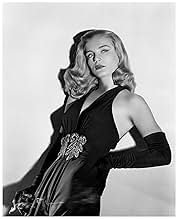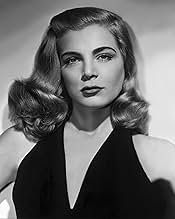Füge eine Handlung in deiner Sprache hinzuA soldier runs away to avoid receiving the Medal of Honor, so his buddy gets permission to investigate. Romance and death soon follow.A soldier runs away to avoid receiving the Medal of Honor, so his buddy gets permission to investigate. Romance and death soon follow.A soldier runs away to avoid receiving the Medal of Honor, so his buddy gets permission to investigate. Romance and death soon follow.
- Bellboy
- (Nicht genannt)
- Man
- (Nicht genannt)
- Mrs. Simpson - Lt. Col. Simpson's Wife
- (Nicht genannt)
- Mabel
- (Nicht genannt)
- Croupier
- (Nicht genannt)
- Dealer
- (Nicht genannt)
- Room Service Waiter
- (Nicht genannt)
- Priest
- (Nicht genannt)
Empfohlene Bewertungen
Returning vet Humphey Bogart, en route to Washington with a war buddy who's about to be awarded some Big Medal, is baffled when said buddy suddenly takes it on the lam. His investigation into what happened and why takes him to a seamy town on America's south coast where, in a morgue, he finds his friend's body, charred beyond recognition. He also meets up with Lizabeth Scott (as Coral Chandler, or "Dusty," or, even, "Mike"), a canary in a local nitery run by heavy Morris Carnovsky. It seems she and the late pal were something of an item, and she teams up with Bogart to get to the truth.
Or does she? The most problematic aspect of the film is that dealing with Scott -- game blonde or femme fatale? It's as if the scriptwriters or studio heads couldn't make up their mind about her, or as if alternative endings were contemplated, or even filmed. This doesn't help the viewer, whose empathy seems always to be out of kilter with what's happening in the plot. And this can't be written off as a teasing ambiguity -- it's a gross failure of filmmaking. So the sentimental, "redemptive" ending in the hospital ward, with high-flown talk of parachute jumps, tries to have it both ways. Well, it can't.
If there's a problem it probably lies in the over-egged script and the purple prose, courtesy of no less than five writers and that includes producer Sidney Biddell who came up with the original story. Bogart is excellent as always and there's nice work from Morris Carnovsky as a bad guy but Lizabeth Scott was certainly no Mary Astor and at times you wonder if her 'bad acting' is bad acting or just 'bad acting', if you get my drift. For some reason the film isn't much seen these days which is a pity because, while no classic, it really is a lot of fun.
William Prince, who later was a more visible actor as a white-haired older man, has a small role as the buddy, who runs away when he learns he's about to receive the Medal of Honor. Later, he's found dead in his home town.
There are the usual ethnic stereotypes - the de riguer black maid, the thug of Italian descent, and the torturing thug of German descent.
The thug in this case is Marvin Miller, who later became the assistant of John Beresford Tipton on the TV show, "The Millionaire." He got to give people $1 million tax free. With prices today, they'd probably all laugh in his face.
Lizabeth Scott is the woman "Johnny" (Prince) was in love with. She's an actress I always found heavy on style and slight on substance.
Beautiful, with a warm smile, and one of the best voices in films, she never exhibited the acting range of, say, Bacall, whom she seemed groomed to follow. In this role, she's not very believable, which is great for the noir films, in which she excelled. You really didn't know how involved she was or wasn't in the crime at hand.
All in all, a very entertaining film with a solid performance by Bogart.
Regarding the film's reference to the "Geronimo" cry that paratroopers made as they jumped, I asked an actual war paratrooper about this, and he said, "We were usually so scared we couldn't make a sound."
This kind of thriller, which now falls under the general rubric of film noir, was losing a little steam by this time. For one thing, Morris Carnovksy's character of Martinelli had been done to death in the previous five years by everyone from Sydney Greenstreet to Otto Kruger. Marvin Miller's hulking, seemingly emotionally disturbed thug had become a commonplace fixture in such films; and while Miller is unique in his heavy-set, Orson Wellesian appearance, there's little that's new here, either. One can imagine script conferences of the day, with young screenwriters falling over one another trying to come up with a new psychological "complex" for the bad guy to be suffering from. Fortunately for the viewer, cliched though this movie is, it was made with extreme professionalism. Leo Tover's cinematography is understated, and nicely suggests the equatorial. John Cromwell was an old stage and movie pro by this time, though his usual magical touch with actors failed him with Miss Scott, he handles the tough guy stuff with suave authority.
Wusstest du schon
- WissenswertesThe film was originally intended by Columbia Pictures' production chief Harry Cohn as a vehicle for Rita Hayworth, a follow-up to the extremely popular Gilda (1946). Cohn thought that the pairing of Hayworth and Humphrey Bogart would be a guaranteed money maker. However, Hayworth was in the middle of a contract dispute with Columbia, and refused to make the film, so she was replaced by Lizabeth Scott, who was borrowed from Paramount Pictures' producer Hal B. Wallis.
- PatzerRip is severely beaten by the gun thug and has cuts near his eyebrow and on his cheek. When he goes to Coral's place, the injuries are still there. He's said to have slept 36 hours but, after waking and shaving, there's no sign of the wounds.
- Zitate
Rip Murdock: You know, the trouble with women is they ask too many questions. They should spend all their time just being beautiful.
Coral Chandler: And let the men do the worrying.
Rip Murdock: Yeah. You know, I've been thinking: women ought to come capsule-sized, about four inches high. When a man goes out of an evening, he just puts her in his pocket and takes her along with him, and that way he knows exactly where she is. He gets to his favorite restaurant, he puts her on the table and lets her run around among the coffee cups while he swaps a few lies with his pals...
Coral Chandler: Why...
Rip Murdock: Without danger of interruption. And when it comes that time of the evening when he wants her full-sized and beautiful, he just waves his hand and there she is, full-sized.
Coral Chandler: Why, that's the most conceited statement I've ever heard.
Rip Murdock: But if she starts to interrupt, he just shrinks her back to pocket-size and puts her away.
Coral Chandler: I understand. What you're saying is: women are made to be loved.
Rip Murdock: Is THAT what I'm saying?
Coral Chandler: Yes, it's a confession. A woman may drive you out of your mind, but you wouldn't trust her, and because you couldn't put her in your pocket, you get all mixed up.
- VerbindungenEdited into Michael Jackson's This Is It (2009)
- SoundtracksEither It's Love or It Isn't
By Allan Roberts and Doris Fisher
Performed by Trudy Stevens (uncredited)
[Coral (Lizabeth Scott) sings the song at the nightclub while she's seated with Rip]
Top-Auswahl
- How long is Dead Reckoning?Powered by Alexa
Details
- Erscheinungsdatum
- Herkunftsland
- Sprachen
- Auch bekannt als
- Maldita mujer
- Drehorte
- St. Petersburg, Florida, USA(Rip and Johnny on Central Avenue)
- Produktionsfirma
- Weitere beteiligte Unternehmen bei IMDbPro anzeigen
Box Office
- Weltweiter Bruttoertrag
- 84 $
- Laufzeit1 Stunde 40 Minuten
- Farbe
- Seitenverhältnis
- 1.37 : 1
Zu dieser Seite beitragen







































